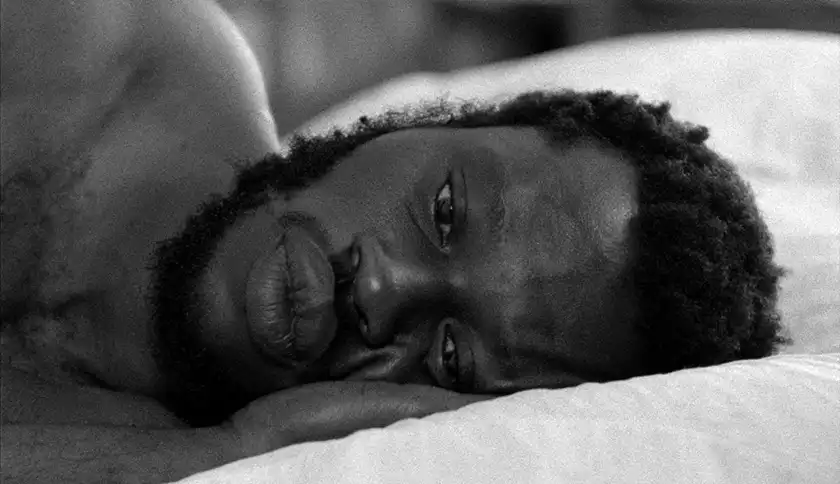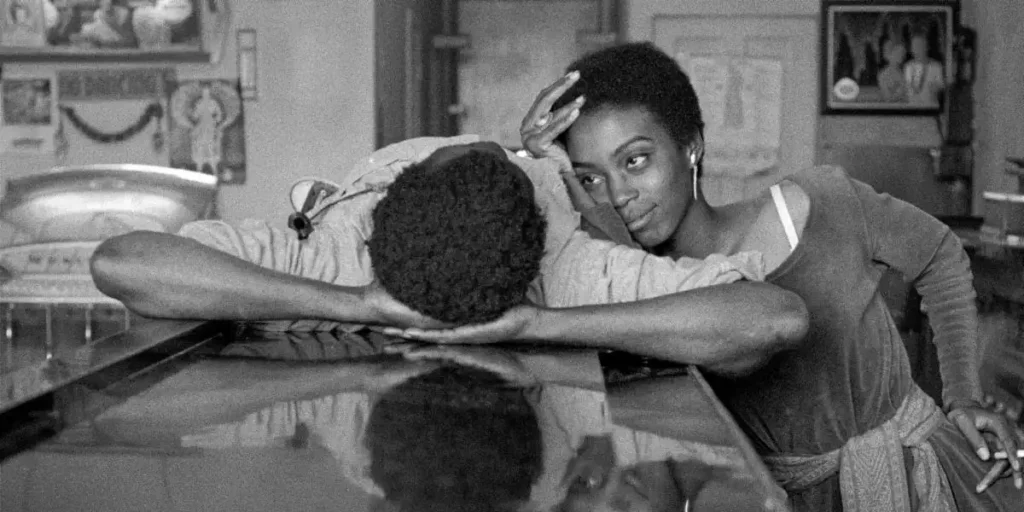David Schickele’s Bushman, a gorgeous odyssey exploring one Nigerian immigrant’s experience living in the U.S., turns into an eyeopening documentary.
When David Schikele set out to tell a fictional story about a young Nigerian immigrant living in the United States at the tail end of the 1960s, there is no way he could have possibly known how life would directly imitate his art. Schikele’s powerful 1971 film Bushman, newly restored in 4K by Kino Lorber and Milestone Film & Video, is a bold exploration of one Nigerian immigrant’s experience during his time in the United States that blurs the lines between drama and documentary out of sheer necessity.
Bushman is a documentary-style film following Gabriel (Paul Eyam Nzie Opokam), a Nigerian student living in San Francisco and attending San Francisco State College. The story follows as Gabriel as he navigates this new place where he is attempting to make a home, surrounded by people intrigued but generally very ignorant of what his life was like back in Africa.
While the first half of the film was shot as a fictional piece of work, halfway through production the lead actor playing Gabriel, Paul Eyam Nzie Opokam, was convicted of a crime in real-time forcing the filming to come to an end and shifting Schikele’s film to one focusing on the wrongful imprisonment and eventual deportation of its star. Strangely enough, Opokam’s fate precisely resembles that which his character was set to face if the film, had it been completed.
Bushman is a film about identity. Gabriel is trying to strike a balance between these two very different lives he has lived, attempting to reconcile a way to unite them. When the film opens, Gabriel is dating Alma (Elaine Featherstone), an African American native San Franciscan who is helping Gabriel understand the cultural differences between Africans and African Americans. The film paints a picture of the stark differences between men like Alma’s brothers, who have grown up in San Francisco and understand the cultural nuances of American Blackness, and Gabriel, who is new to this expression of identity and trying to acclimate.
The film is impactful in this way specifically: while there are many scenes that allow Gabriel to speak on his experience in Nigeria and how it differs from that of his life in San Francisco, there are also more direct and literal comparisons to show the stark, and at times comedic, differences in these cultures.

It seems that, in Gabriel’s life in San Francisco, no one has an accurate grip on what life is really like in Nigeria. He often is able to use people’s lack of understanding comedically to his advantage, but there are several times throughout the film Gabriel makes it clear this weighs heavily on him and his ability to build a life in America.
Bushman is able to actualize and explain the weight of these differing cultural expectations Gabriel faces in a tangible way. Specifically, Gabriel speaks about his time attending a Catholic church and hearing about what constitutes sinning in western catholicism. He says that there were so many actions the catholic church was condemning as sins that directly coincided with things people in his village would do on a daily basis in Nigeria, such as women baring their breasts.
Bushman does a beautiful job at tackling the stereotypes put on African cultures and explaining the culture that so many don’t even attempt to understand but rather condemn as “primal”. Gabriel has an air of lightness about the ignorance surrounding his home, as he recognizes the bizarreness of American culture and how Blackness is accepted or expressed.
Eventually, the tides of the film turn, and the audience is told that the movie cannot continue as the man behind the character of Gabriel, Paul, has been arrested and is facing deportation (the same fate his character was set to face). That’s when it becomes clear that this goes beyond a story trying to fictionally emulate the experience of a young Black immigrant in the U.S.: it’s a very real story about the very real realities Paul has to face.
Schikele says it best when explaining why Paul cannot continue to shoot the film: “truth was never stranger than fiction, just faster”. There were direct similarities between Gabriel and Paul as men. The most obvious is their circumstances, as both the man and the character were Nigeran immigrants that came to the United States for their education. But the biggest similarity between the two is revealed indirectly through the filmmaking.
Gabriel as a character doesn’t take the ignorance towards his culture and let it define him. He stays light and open to understanding others even though they may not try to understand him. Similarly, when Paul is imprisoned and tried for deportation, he refuses to be let this injustice define his attitude towards life. He says that, when things weigh on him, he smiles, because “smiles can never die”. Both the man and the character have a devotion to seeing the world around them as a place to learn.
The new 4K restoration of David Schikele’s 1971 film, out soon in theaters in New York, is beautiful in both presentation and content. It’ll make you challenge your openness to understanding the different cultural experiences that exist all around you and the injustices in the world that face many. Go into it with an open mind, but more importantly, with a curious heart.
Kino Lorber and Milestone Film & Video’s new 4K restoration of Bushman (1971) will open at the Brooklyn Academy of Music in New York on February 2, 2024: it will be the first time in decades that the film will be widely available. More cities will follow.

